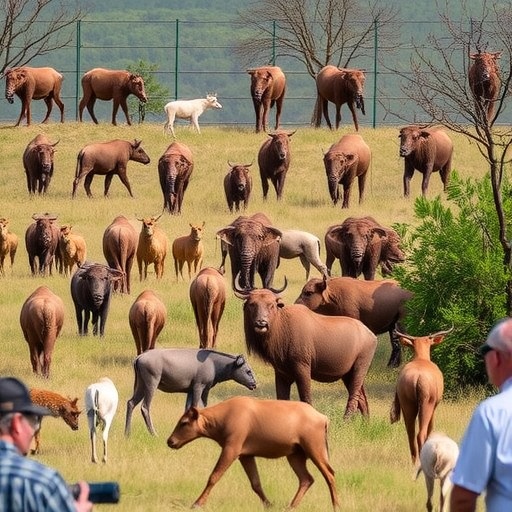In the intricate web of ecological systems, the interplay between climate change, human population growth, and poverty is forging a new path toward unprecedented human-wildlife conflicts, particularly in Africa. As Gayo’s illuminating review unfolds, it paints a stark picture of how these converging forces threaten not only wildlife but also local communities dependent on these ecosystems for their livelihoods. The repercussions of this entanglement extend beyond mere environmental degradation, stirring social unrest and economic instability that reverberates throughout the continent.
The specter of climate change looms large over Africa, manifesting in increasingly erratic weather patterns that challenge the delicate balance of ecosystems. Rising temperatures and altered precipitation patterns disrupt traditional habitats, leading to shifts in animal behaviors and migration patterns. As species struggle to adapt to these changes, they often encroach upon human settlements in search of food and water, generating conflicts that are both predictable and devastating. This phenomenon poses unique challenges for conservationists and policymakers who must navigate a landscape laden with competing interests.
Simultaneously, the relentless march of human population growth exacerbates these tensions. Africa is projected to witness significant population surges in the coming decades, with urban centers swelling as rural inhabitants flock to cities in search of better opportunities. This migration places immense pressure on adjacent natural areas, as expanding urban footprints encroach upon once-vibrant wildlife habitats. Communities are often forced into direct competition with wildlife for dwindling resources, inevitably leading to conflicts that can have violent and tragic outcomes.
Poverty further complicates this already fraught dynamic. Many rural communities rely heavily on subsistence farming and livestock rearing. As climate change intensifies and wildlife encroaches, these populations find their livelihoods increasingly threatened. Resource scarcity breeds desperation, and in such contexts, the potential for conflict escalates. Farmers may resort to retaliatory measures against wildlife that threaten their crops or livestock, creating a vicious cycle of violence that endangers both species and ecosystems.
The unique socioeconomic context of Africa adds layers of complexity to these issues. Variances in local governance, access to education, and economic resources dictate how communities respond to wildlife encounters. Often, marginalized populations bear the brunt of wildlife conflicts without the necessary support systems in place to mitigate their impacts. A lack of awareness regarding wildlife behavior and conservation practices can lead to fatal misunderstandings and exacerbated conflicts, underscoring the need for comprehensive educational initiatives.
As wildlife habitats shrink and human populations expand, the management of wildlife resources becomes increasingly critical. Sustainable practices can serve as a bridge, fostering coexistence between humans and wildlife. Innovative strategies that empower local communities—such as wildlife corridors, compensation schemes for livestock loss, and community-based conservation programs—are essential in mitigating human-wildlife conflicts. Such strategies can help balance the scales, allowing people to thrive while safeguarding the rich biodiversity that defines the African landscape.
Technological advancements hold promise in addressing and even predicting conflict scenarios. Remote sensing, for instance, enables researchers to monitor changes in land use and wildlife patterns in real time. Coupled with data analytics, these tools can help forecast potential conflict zones, allowing for proactive measures to be taken. As conservation science continues to evolve, integrating technology into management practices opens pathways for innovative solutions that have the potential to reshape narratives of conflict.
Gayo’s review emphasizes the urgency with which these intertwined issues must be addressed. With predictions suggesting that millions of additional people will inhabit Africa by 2050, policy frameworks must address not only the ecological implications of this growth but also consider the social ramifications. Inclusive dialogues that incorporate perspectives from affected communities can lead to more equitable policies, fostering a collective responsibility to protect both people and wildlife.
In addition, fostering partnerships among governments, NGOs, and local communities can amplify efforts to mitigate conflicts. Collaborative approaches that recognize the interdependence of human and wildlife needs can form the foundation for more resilient communities. By ensuring that local people have a stake in conservation—whether through ecotourism initiatives or sustainable agricultural practices—long-term solutions become increasingly feasible.
Finally, while challenges abound, there lies immense potential for transformative change. By recognizing the intertwined fates of human populations and wildlife, stakeholders can forge new pathways toward coexistence. Comprehensive approaches that tackle the root causes of conflict—addressing climate change impacts, population pressures, and poverty—will be essential in ensuring a sustainable future.
In conclusion, the intricate dynamics between climate change, human population growth, and poverty cannot be overstated. As Gayo’s enlightening review outlines, the urgent need for integrated strategies that promote cohabitation between humans and wildlife is paramount. Only through collective efforts can we hope to mitigate the human-wildlife conflicts that threaten the delicate balance of Africa’s ecosystems and the communities that depend on them.
Subject of Research: Climate change, human population growth, and poverty as drivers of human-wildlife conflicts in Africa
Article Title: A review of climate change, human population growth and poverty as potential drivers of human wildlife conflicts in Africa.
Article References:
Gayo, L. A review of climate change, human population growth and poverty as potential drivers of human wildlife conflicts in Africa.
Discov Anim 2, 49 (2025). https://doi.org/10.1007/s44338-025-00088-5
Image Credits: AI Generated
DOI: 10.1007/s44338-025-00088-5
Keywords: Human-wildlife conflict, climate change, population growth, poverty, conservation, Africa




